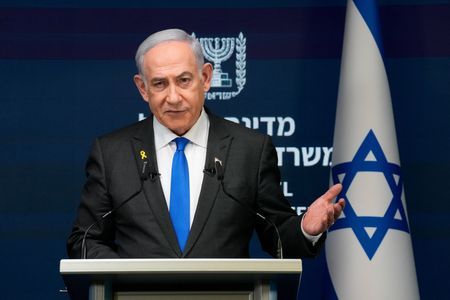Israel duty-bound to retaliate against Iran’s missile attack - Netanyahu

Israeli Prime Minister Benjamin Netanyahu says his country will retaliate against Iran following what he called one of the largest missile attacks in history.

Israeli Prime Minister Benjamin Netanyahu says his country will retaliate against Iran following what he called one of the largest missile attacks in history.
Scores of ballistic missiles were launched by Iran toward Israeli cities and military targets last Tuesday. Since then, the entire region has been anticipating an Israeli response to Tehran's second direct attack on Israel since April.
“Iran has twice fired hundreds of missiles at our territory and our cities — ballistic missile attacks among the largest in history,” Netanyahu said in a video statement recorded in his office in Tel Aviv after the Rosh Hashanah weekend.
The Israeli prime minister said no country in the world would accept such an attack on its cities and citizens, and the Jewish state will not either. “Israel has the duty and the right to defend itself and respond to these attacks — and we will do so.”
Netanyahu portrayed the missile attack as part of a broader Iranian strategy to fuel a multi-front war against Israel, using its proxy forces across the Middle East, including Hezbollah in Lebanon and Hamas in Gaza. “As Israel fights the forces of barbarism led by Iran, all civilized countries should stand firmly by Israel's side,” he declared, calling for international support in Israel's fight against Iran.
Hossain Aghaei, an analyst of international relations and strategic affairs, said in an interview with Iran International that "the Iranian government’s efforts to establish deterrence through its proxy groups are futile."
The analyst said the Islamic Republic does not even have a strategic ally in times of danger, and "relying solely on proxy groups will not lead to any success."
Meanwhile, in a broadcast to mark one year since Hamas’s October 7 attack, Israeli President Isaac Herzog underscored that the nation remains vulnerable, with hostages still held by Hamas and residents displaced due to ongoing conflict. He highlighted Iran’s role in supporting militant groups that continue to threaten Israel, stating, "It is in the ongoing threat to the Jewish state by Iran and its terror proxies, who are blinded by hatred and bent on the destruction of our one and only Jewish nation state."
Israel’s Foreign Minister Israel Katz also issued a warning to Iranian Supreme Leader Ali Khamenei on social media, urging him to withdraw Iranian proxies from Lebanon. “Khamenei, take your proxies and leave Lebanon,” Katz wrote in a post on X, alongside images of slain Hezbollah leader Hassan Nasrallah and his likely successor Hashem Safieddine, who is believed to have been targeted by Israeli forces.
Israeli military spokesman Rear Adm. Daniel Hagari also stated on Saturday that his country's response to Iran's "disgraceful attack" will be carried out "in the manner, at the location, and at the timing which we decide."
He acknowledged the strikes but stressed that the Israeli Air Force (IAF) remains fully operational. “There were several impacts in the center of the country, in civilian areas, and there were also impacts in airbases, in Nevatim and Tel Nof,” Hagari said, while assuring that “these impacts did not hit planes and did not harm the Air Force’s competence. The airbases, both Nevatim and Tel Nof, are fully functioning.”
Iran responds to Israeli threats
Iranian officials have not backed down in response to Israel's warnings. IRGC Navy Commander Alireza Tangsiri in a statement on Saturday vowed that Iran would resist any Israeli action.
“The message of peace and friendship to our friends is that ‘we can,’ but the message to our enemies is that if they want to play with fire in the region, we will stand against them decisively,” Tangsiri said. He added that Iran is preparing for any situation, and that “the Leader of the Revolution and the Commander-in-Chief of the IRGC always emphasize the need for full readiness and vigilance to face both normal and exceptional circumstances in the region.”
In a press conference held in Syria, Iranian Foreign Minister Abbas Araghchi also promised a stronger response to any Israeli aggression. “Our response to any Israeli aggression will be clear and direct. Every action will be met with a similar, proportional, and even stronger reaction,” Araghchi stated. “This is something we have repeatedly proven, and they are welcome to test us.”
CENTCOM chief in Israel as tensions mount
As tensions between Israel and Iran continue to rise, US CENTCOM chief Gen. Michael Kurilla arrived in Israel on Saturday for high-level meetings with Israeli defense and military officials. Kurilla’s visit underscores the United States' commitment to its ally Israel as both countries prepare for potential escalation in the aftermath of the Iranian missile attack.
Israel is coordinating its preparations for a retaliatory attack on Iran with Washington, an Israeli official told the country's state broadcaster, adding that "all scenarios" are on the table.